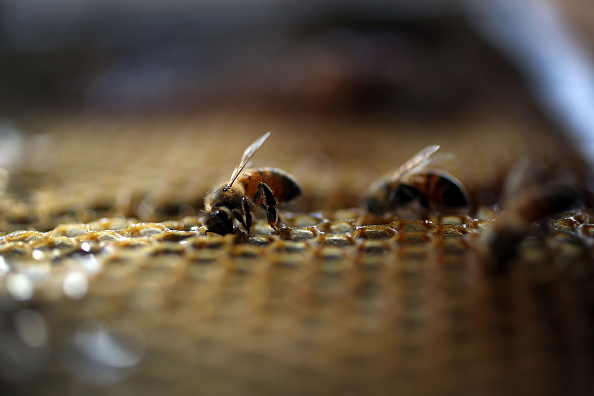EPA: Pesticides could be causing honeybee population collapse


A free daily email with the biggest news stories of the day – and the best features from TheWeek.com
You are now subscribed
Your newsletter sign-up was successful
The Environmental Protection Agency announced Wednesday that there is evidence indicating a common pesticide could be causing some pollinators, including honeybees, to die. Beekeepers and environmentalists have long suspected the pesticide imidacloprid to be a cause of "colony collapse disorder," or the widespread death of bees — but the EPA is only just beginning its preliminary assessment to consider whether to control the use of the pesticides. In the European Union, imidacloprid is one of several banned pesticides.
Imidacloprid is used to keep pests like aphids and beetles from killing crops by attacking their central nervous systems. However, the EPA acknowledged that the pesticide "potentially poses risk to hives when the pesticide comes in contact with certain crops that attract pollinators." Some critics don't think the EPA went far enough in their report, because the organization chose to focus on honeybees specifically rather than looking also at native bee species. Others see the EPA's study as too little too late.
"The problem is we should have all been looking at this stuff a long time ago. The same people who produced the chemicals are the ones that did the testing in the first place, and now all the EPA has gone and done is asked those companies to retest those chemicals," beekeeper Dave Hackenberg told The Guardian.
The Week
Escape your echo chamber. Get the facts behind the news, plus analysis from multiple perspectives.

Sign up for The Week's Free Newsletters
From our morning news briefing to a weekly Good News Newsletter, get the best of The Week delivered directly to your inbox.
From our morning news briefing to a weekly Good News Newsletter, get the best of The Week delivered directly to your inbox.
Larrissa Walker, the head of the pollinator program at the Center for Food Safety, felt the same. "We have been saying for several years now that the EPA has enough information and data available to them to take strong action and to severely reduce the amount we are using these chemicals. The new report supports the need for the EPA to really reduce and restrict the use of these chemicals," Walker said.
A free daily email with the biggest news stories of the day – and the best features from TheWeek.com
Jeva Lange was the executive editor at TheWeek.com. She formerly served as The Week's deputy editor and culture critic. She is also a contributor to Screen Slate, and her writing has appeared in The New York Daily News, The Awl, Vice, and Gothamist, among other publications. Jeva lives in New York City. Follow her on Twitter.
-
 How the FCC’s ‘equal time’ rule works
How the FCC’s ‘equal time’ rule worksIn the Spotlight The law is at the heart of the Colbert-CBS conflict
-
 What is the endgame in the DHS shutdown?
What is the endgame in the DHS shutdown?Today’s Big Question Democrats want to rein in ICE’s immigration crackdown
-
 ‘Poor time management isn’t just an inconvenience’
‘Poor time management isn’t just an inconvenience’Instant Opinion Opinion, comment and editorials of the day
-
 Nobody seems surprised Wagner's Prigozhin died under suspicious circumstances
Nobody seems surprised Wagner's Prigozhin died under suspicious circumstancesSpeed Read
-
 Western mountain climbers allegedly left Pakistani porter to die on K2
Western mountain climbers allegedly left Pakistani porter to die on K2Speed Read
-
 'Circular saw blades' divide controversial Rio Grande buoys installed by Texas governor
'Circular saw blades' divide controversial Rio Grande buoys installed by Texas governorSpeed Read
-
 Los Angeles city workers stage 1-day walkout over labor conditions
Los Angeles city workers stage 1-day walkout over labor conditionsSpeed Read
-
 Mega Millions jackpot climbs to an estimated $1.55 billion
Mega Millions jackpot climbs to an estimated $1.55 billionSpeed Read
-
 Bangladesh dealing with worst dengue fever outbreak on record
Bangladesh dealing with worst dengue fever outbreak on recordSpeed Read
-
 Glacial outburst flooding in Juneau destroys homes
Glacial outburst flooding in Juneau destroys homesSpeed Read
-
 Scotland seeking 'monster hunters' to search for fabled Loch Ness creature
Scotland seeking 'monster hunters' to search for fabled Loch Ness creatureSpeed Read
